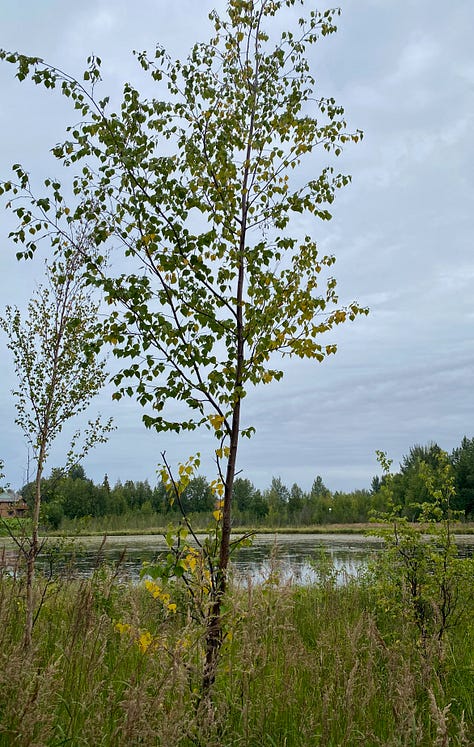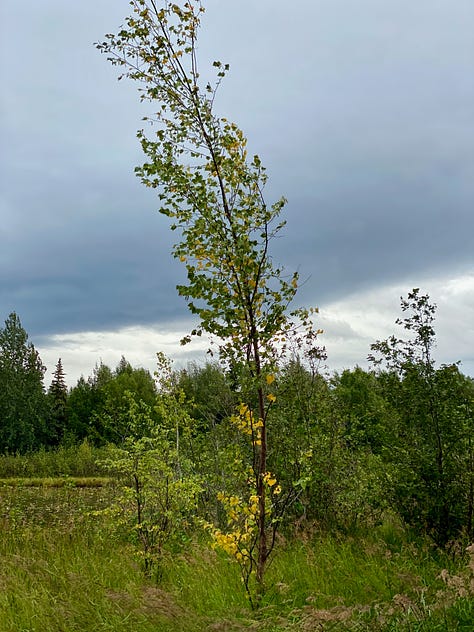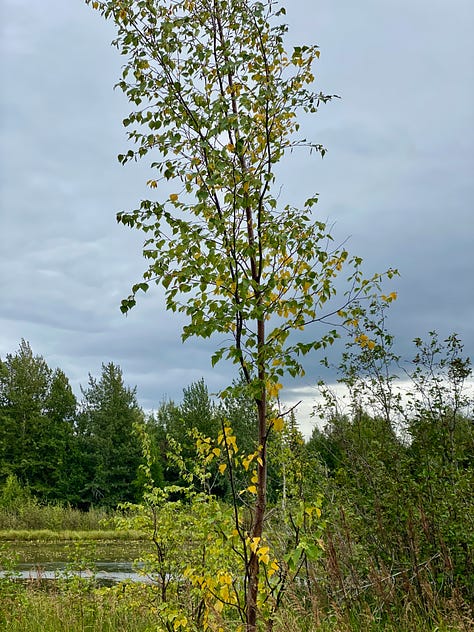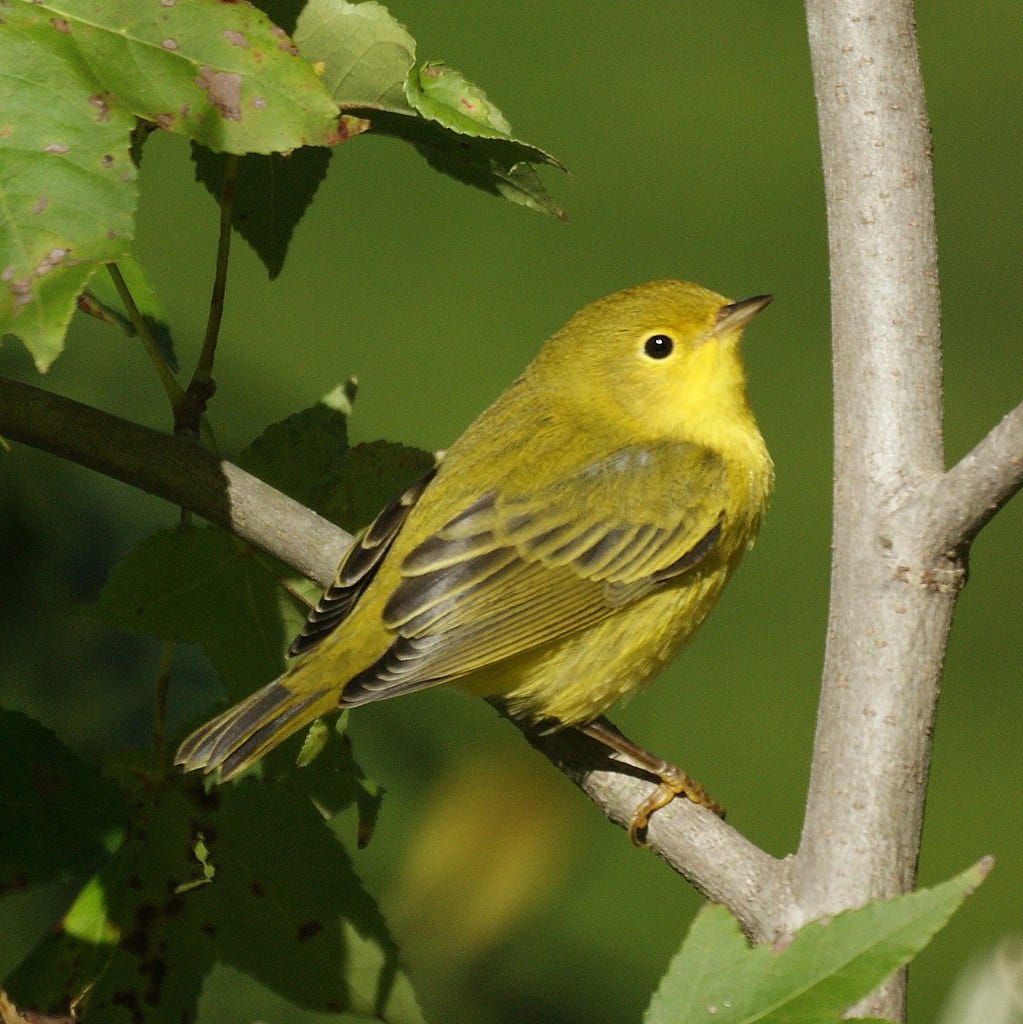The days are noticeably inclining towards equinox. There’s a different quality of light—in one day it seems to shift, to feel ever so slightly higher, at a further distance. And then after you notice this, the next day you hear the sound of geese flying high one morning, testing the air for their journey south. A few birch leaves have begun to take on the hue of that distancing sunlight—yellowing in a few small bursts here and there. And you know it’s begun—it will soon be turning cooler.
The bright glimpses of newly-golden leaves make it hard to see the few yellow warblers that have been around from time to time over the summer. Secretive creatures, I rarely see them but have noticed a few in the last couple of weeks, glimpsed in shocks of yellow as they fly—almost as if they had metamorphosized from the yellow pockets of leaves, coming to life in the wind before they too fly for warmer latitudes.



But one day last week a warbler visited and the experience hasn’t left my thoughts for days. One of those occurrences where the only thing that remains is one’s own memory, becoming more distinct over time, like film developing into view. Trying to write about such things always feels elusive—it so quickly falls into clumsiness, embarrassing in its possible triteness. And yet I keep trying.
So. Last week I went out to check on my dog Carlo, who was out in the yard longer than usual, doubtless enjoying digging up the lilac I planted this summer. I walked onto the deck and was stunned to find a yellow warbler on the ground, equally stunned and window-hit, one of its wings fanned out as if it may have been broken. I was devastated to find such a beautiful creature dead or dying—all because the house was obstructing its flight. And yet I was also in awe—what a beautiful creature to see up close, its secretive glimpses held in stasis in front of me. I knelt to see if I could help, and she was still alive. And suddenly I found myself picking her up, the slight body fitting cautiously into my hands. It felt like holding a feathery, beating heart.
She was nervous and alert enough to gape just a bit, and I worried that I might stress her more, but I didn’t want the dogs to see her and make her more anxious, and didn’t have a way to find a box to place over to give her a quiet space to (hopefully) recover. I took her over to the railing edge at the corner of the deck, hoping she might step from my hand onto the platform and stay there to rest. Instead, she stopped gaping and stayed in the well of my palm as I opened it flat. And then stayed there for over half an hour.

I hadn’t really been able to study the gradations of soft color on a wild bird before, the details of each band on her impossibly tiny feathers as they washed from grayish to green to yellow—the exact color of the birch trees around us. Sunlight that happened to be out after days of rain shone through the leaves in between shadows, the light moving in and out, highlighting different parts of her body. I watched the white rim of her eye start to close slightly, and I whispered softly for her to stay awake. She’d open her eyes a bit more, and we continued on like that for some time, as I tried to stay as still as her. I braced myself that she may not recover, the thought of having to bury such a beautiful creature of leaves and sky into the earth feeling like blasphemy. I stayed as still as I could, talking quietly from time to time, trying to etch into my memory the sweetness of her eyes, her looks towards me, growing a bit more alert, it seemed, the longer she sat in my palm. I was mesmerized with hope. Hope, that thing with feathers (well played, Emily Dickinson).
She started to close her eyes a bit less, and started to crane her neck just a bit more to look around, and at me occasionally. Then she’d resume her stillness. And then, before showing any hint of movement, she flew off into the trees with the quiet thrum of her wings on air.
Afterward, I kept thinking of Hopkins: My heart in hiding / Stirred for a bird,—the achieve of, the mastery of the thing!
The root of our English word “mystery” is a Greek verb, muein, which means to close the mouth. Dictionaries tend to explain the connection by pointing out that the initiates to ancient mysteries were sworn to silence, but the root may also indicate, it seems to me, that what the initiate learns at a mystery cannot be talked about. It can be shown, it can be witnessed or revealed, it cannot be explained. —Lewis Hyde, The Gift
I recently read Anne Carson’s Eros the Bittersweet, a collection of brilliant essays exploring the ways that the ancient Greeks understood Eros—that thing on wings that comes in and surprises us in the now of desire, and yet remains as impossible to hold onto as a bird that recovers and flies away.
There are so many ways to be surprised by gradations of eros, of a sudden love you could never anticipate. Because I did really feel love for that bird. I was struck by the feel of her feet—so, so slight, the smallest of talons on my skin. Such a slight weight it barely registered, like trying to hold a breeze. Eventually, I wasn’t able to distinguish the feel of her body from my own skin. It felt like I was as much a part of the bird as she was of my palm for that still, protracted moment.
I didn’t know I was lacking the feel of a small songbird in my palm, with wings that could fly but weren’t yet ready to. But the recognition of that lack, the familiarity of it, is an essential part of eros for the Greeks. Carson writes of the paradox and punning language of eros:
[Sokrates]... takes up the question whether the desire to love or befriend something is ever separable from lack of it…that all desire is longing for that which properly belongs to the desirer but has been lost or taken away somehow—no one says how.1
And it did feel like that paradox of wanting/not wanting—to possess or hold onto a beloved moment. Part of me wanted to keep the warbler with me, to have her live alongside me. And yet I wanted desperately for her to be well and to fly away. And I wanted to know what it would be like to be that slight, and have wings. And isn’t all of that a kind of love—longing for an other that feels like a part of yourself you hadn’t recognized or needed? But knowing that if you tried to possess the other, it would no longer exist? It would no longer be something outside of yourself to lean towards, without some necessary distance between.
Carson goes on to write of eros as:
an edge between two images that cannot merge in a single focus because they do not derive from the same level of reality—one is actual, one is possible. To know both, keeping the difference visible, is the subterfuge called eros.2
And thus, it’s that sense of sweetbitter that Sappho coined of love:
The moment when we understand these things—when we see what we are projected on a screen of what we could be—is invariably a moment of wrench and arrest. We love that moment, and we hate it. We have to keep going back to it, after all, if we wish to maintain contact with the possible. But this also entails watching it disappear.... Sappho drew this conception together and called Eros glukuprikon [sweetbitter].3
Or as Sappho has it in fragment 31:
[Eros] puts the heart in my chest on wings.4
In mysticism, there’s a tradition of a mystical or transcendent experience being unsayable—in a sense, the idea that mystery can't have too fine a point placed on it. The Greeks called this apophasis—an unsaying or speaking away. To invoke presence through absence. As opposed to cataphasis, where presence is described in every detail.
This is a part of other traditions as well. Poetry is made through the play of blank space, the control (or not) of the right-hand margin, the breaks between lines. Similarly to transcendent or mystical writings, the power of a poem vanishes into thin air when someone tries to define or describe what the writer left off the page.
I’ve been wanting to write about the warbler, but find it so awkward and clumsy. This is at least my sixth attempt. And it’s a bit mad, really—to be overly precious about a poor wounded bird, who shouldn’t have been wounded in the first place if our house didn’t insist on being where it is, if our windows wouldn’t act like a mirror. As my teenage son said when I told him about the warbler: “aw, you had your disney princess moment. You’re gonna get avian flu (eye roll). Ha!—now that’s a disney princess movie I’d like to see!”
I’m sure these birds are young, it’s turning to fall and migrations beckon, shifting other birds’ routines, and it’s all a bit of a jumble and confusion—particularly when houses are intent on being porous and in the way. I can logic away why such things occur, and how there is nothing out-of-the-ordinary about it.
But in truth, I’d rather not. I’m so troubled by birds hitting windows, and yet I’m so grateful to have had that experience. To know what it’s like to have a secret from the trees become part of your palm while it recovers. The sweetness of that passerine bird eye, the soft feel of the feathered, slight body in my palm, being able to really know the details of that bird’s beauty. To watch her strongly fly off unharmed—and to know something of an other life in such a small, ordinary but un-ordinary way. A life with wings, no less. Two different realities—one actual on the ground, one possible in the sky.
Moments that melt the boundaries between subject and object, divine and human, self and other is often how mystical union or transcendence was described by medieval writers. Such occurrences are also described as an interjection of the extraordinary into the ordinary. A sudden rush of eros on an ordinary day. Michael Sells writes that while this mystical experience is an extraordinary occurrence, it is often cloaked in the common:
In apophatic mystical texts, there is indeed a sense of the extraordinary, but the extraordinary, the transcendent, the unimaginable, reveals itself as the common.5
Something that is common, occurs in a way that can be rationalized as ordinary, within the routine of ordinary, but becomes a personal memory of significance. It’s a feeling of mystery that is key—an expansiveness that opens into other kinds of ideas, lives, spiritual realms (if you’re a mystic). But it is fleeting. Sells continues:
…as soon as one thinks one has it, one has lost it. It is glimpsed only in the interstices of the text, in the tension between the saying and the unsaying. Yet as elusive as it is, it is in principle accessible to all.6
There is a lot in this that feels right about out-of-the-ordinary experiences that feel impossible to write about. I know that the more concrete idea I have for a poem, the less it will materialize on the page. The muses don’t enjoy being instructed. And yet how to hold on or commit to memory these extra-ordinary ordinary occurrences, the ones that won’t leave your mind no matter how much time passes. Moments cut out of real time.
When it comes to the way that eros arrives in our lives, Carson describes it with similar language—that it resists the past tense, which writing or language or art would try to capture, pin down into one set time to revisit. Eros is the insertion of now into the common; the now remains sunk below the usual flow of time and experience, into what is becoming, what is timeless:
‘Now’ is a gift of the gods and an access onto reality. To address yourself to the moment when Eros glances into your life and to grasp what is happening in your soul at that moment is to begin to understand how to live. Eros’ mode of takeover is an education: it can teach you the real nature of what is inside you. Once you glimpse that, you can begin to become it.7
Maybe it’s worth saying here that I do not believe I will nor have I ever had an inkling for becoming a disney princess. Or a bird—not seriously at least.
But there is something undeniably magical about interactions like these—how they stay with you, pull you out of the current of time for a brief moment of stasis that becomes—and continues as—memory. Of different possibilities, different lives lived. A gift of interaction, a reminder that we are in fact porous and in and of the world with others.
And how impossible it is to describe such an exchange or experience without sounding, trite, mad, or precious—because ordinary mystery is something that has to remain unsaid. A reason that mystery means a mouth closed, a willingness to not say—or is simply beyond spoken (and written) language.
We allow those memories to become and continue reaching for the distance between—to maintain contact with the possible while we watch it disappear from view.
Carson, Anne. 1986. Eros the Bittersweet. Princeton University Press. p. 33
Ibid. p. 76
Ibid. p. 69
Ibid. p. 89
Sells, Michael A. 1994. Mystical Languages of Unsaying. University of Chicago Press. p. 8-9
Ibid.
Carson, p. 153










Freya this is all so touching really! I once tried to save a wild starling chick who probably fell off of her nest due to a particularly bad monsoon storm. My dad brought her home on a stormy evening. He said her nest was on top of the electricity pole, it confused and angered me beyond belief that the poor birds had to build its nest at such unsafe and vulnerable spot because we humans have destroyed their natural habitat to build our parasitic colonies. We made her a resting place out of a small plastic basket, I personally lined it with cotton and straw to keep her warm. But alas, we hardly possessed the skills of the mama bird to be able to nourish and nestle the chick back to health, she died the next morning. I remember the awe I experienced when I first felt her tiny feathered pulsing heart, I remember the grief that engulfed me on losing her the next day. I spent the whole morning sitting next to the basket soaked in tears, wondering of the blue skies and the thick canopies to which she belonged. I was only 10 and didn’t understand much about death but that incident definitely made me question a lot about what I knew to be true about my reality.
Suffice to say that your story brought back the same experience of wonder, awe, anger, and despair. I am happy that your yellow warbler had a happy ending though! Thank you for sharing this experience, it struck a very special chord within me. Every time I read something that you have written, a mystical sense of knowing, a kinship, overpowers me, maybe we are not so different, separated by geographies and race, as the world would have us believe. Thank you for caring and giving space for such a beautiful creature to heal. Reminds me of Emily Dickinson’s “If I can stop one heart from breaking”
If I can stop one heart from breaking,
I shall not live in vain;
If I can ease one life the aching,
Or cool one pain,
Or help one fainting robin
Unto his nest again,
I shall not live in vain.
I was watching a yellow warbler high up in a tree a couple months ago, and was struck by how well they blend in. It reminded me that humans have a pretty limited visual field when it comes to colors. As yellow as they seem, they match right in with the green of the trees; or perhaps as green as the trees seem, yellowness we can't perceive hides the warbler, releasing only their song.
I'm ashamed to say that despite being taken by all the beauties in this piece, it's an enticing distraction to think of a Disney movie where the hero/ine(s) get avian flu. Perhaps it could say something about the need for mutual aid instead of solitary heroes.